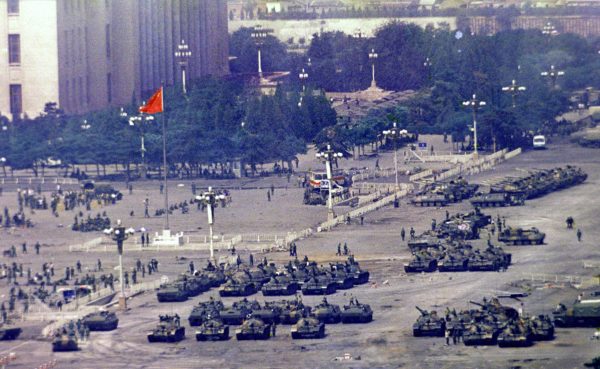Why did the Tiananmen Square incident happen on June 4, 1989?
The June 4th incident on Tiananmen Square in 1989 was caused by a series of political, social, and economic factors.
- Political instability: 1989 was a period of political instability in China, due to various historical reasons including China's response to the Soviet Union, domestic anti-corruption struggles, and economic reform processes, leading to political instability and social unrest.
- Economic difficulties: In the late 1980s, China's economy encountered a series of problems, including inflation, rising unemployment, stagnant wages, etc., making life difficult for the people, especially for those in the low-income strata.
- Political repression: In the 1980s, the Chinese government's control over intellectuals and civil society became increasingly stronger, and restrictions on freedom of speech also intensified, leading to dissatisfaction and resentment among many people towards the government.
- Call for democracy: In 1989, some intellectuals and young people developed a strong interest in Western democratic systems and liberal ideas, demanding political reform, genuine democracy, and freedom from the government.

What happened during the Tiananmen Square incident on June 4th, 1989?
On June 4th, 1989, the Chinese government launched a violent crackdown against thousands of protesters who had gathered on Tiananmen Square in Beijing, an event known as the "June Fourth Incident." Students were among the main participants in the protest movement, demanding political reforms and anti-corruption measures. The Chinese government used various methods to suppress the protests, including:
- Deploying troops: The government mobilized large numbers of troops and police, using weapons such as tanks, rifles, and armored vehicles to clear the protesters from Tiananmen Square. Hundreds, and possibly thousands, of people died in the crackdown.
- Blocking information: The government imposed tight censorship measures to prevent news of the crackdown from spreading. It prohibited foreign news media and journalists from entering Tiananmen Square, shut down telephone and television signals, and restricted internet access.
- Making arrests: The government carried out widespread arrests and detentions of those who participated in the protests. Many were charged with "counter-revolutionary crimes" or similar charges and were sentenced to long-term imprisonment.
- Conducting trials: The government tried those who were arrested and conducted public propaganda campaigns to convey political messages and strengthen its control over the public.
These suppression measures resulted in numerous deaths and arrests and had a profound impact on Chinese society and the political environment, fueling dissatisfaction and opposition to the authorities.
What were the impacts after June 4th, 1989? Do people born after the event know the truth about it?
After the events of June 4, 1989, the Chinese Communist Party launched a massive crackdown, arresting, trying, and imprisoning participants and supporters. Many students and intellectuals were arrested and detained, and many were charged with "subverting state power" or similar crimes, facing extremely harsh punishments.
In addition, the Chinese government also took other measures to restrict freedom of speech and political activities of students and intellectuals, and suppressed and cracked down on protest activities. These measures lasted for a considerable period of time and had a profound impact on China's social and political environment.
To this day, the Chinese government remains silent on the June 4th incident, prohibiting open discussions about it and continuing to restrict freedom of speech and political activities. In 2001, five supporters of the "6.4 incident" resorted to extreme measures of self-immolation in Tiananmen Square, attempting to force the Chinese Communist authorities to abandon inhumane detention of those involved in the "6.4 incident" and to clear the names of the participants. However, they were arrested by the Chinese Communist authorities and accused of being members of an "evil cult" organization. The five supporters were sentenced to life imprisonment at most (News from Sina: https://news.sina.com.cn/china/flgts/index.shtml).
ProgramThink's Original Article: https://program-think.blogspot.com/2011/06/june-fourth-incident-0.html
1989.6.4事件为什么发生?
1989.6.4天安门广场事件是由一系列政治、社会和经济因素导致的:
政治不稳定:1989年是中国政治不稳定的时期,由于历史上的种种原因,包括中国对苏联的反应、中国国内的反腐斗争和经济改革进程等问题,导致了政治不稳定和社会动荡。
经济困难:在20世纪80年代末期,中国经济出现了一系列问题,包括通货膨胀、失业率上升、工资不涨等,使得人民生活变得困难,特别是对于低收入阶层来说。
政治压制:在1980年代,中国政府对知识分子和民间社会的控制越来越强,同时也对言论自由的限制日益加剧,这导致了许多人对政府的不满和反感。
民主呼声:在1989年,一些知识分子和年轻人对西方民主制度和自由思想产生了浓厚兴趣,他们要求政府进行政治改革,推行真正的民主和自由。
1989.6.4当天具体发生了什么?
1989年6月4日,中国政府在北京发动了针对天安门广场上聚集的数千名抗议者的武力镇压,这场事件被称为“六四事件”。学生是这场抗议运动的主要参与者之一,他们要求政府进行政治改革和反腐斗争。当时的中国政府采取了多种手段进行镇压,包括:
部署军队:政府出动了大批的军队和警察,使用了坦克、步枪和装甲车等武器,进入天安门广场清除抗议者。数百人甚至上千人在镇压中丧生。
封锁消息:政府采取了严密的封锁措施,以阻止有关镇压的消息传播。它禁止外国新闻媒体和记者前往天安门广场,关闭了电话线和电视信号,并限制了网络访问。
执行逮捕:政府对参与抗议的人进行了大规模逮捕和拘留。很多人被指控为“反革命罪”或其他类似罪名,并被判处长期监禁。
进行审判:政府对被捕的人进行了审判,并进行了公开的宣传活动,以向公众传递政治信息,以加强对政府的控制。
这些镇压措施导致了许多人的死亡和捕抓,同时也对中国社会和政治环境产生了深远的影响,形成了人们对当局的不满情绪和反对声音。
1989.6.4后有什么影响?出生于事件发生后的人,是否知道事件的真相?
在事件发生后,中国共产党采取了大规模的镇压行动,对参与者和支持者进行逮捕、审判和监禁。大量的学生和知识分子被捕并被关押,很多人被指控“颠覆国家政权罪”或其他类似的罪名,面临着极其严厉的刑罚。
此外,中国政府还采取了其他手段,限制了学生和知识分子的言论自由和政治活动,对抗议活动进行了打压和镇压。这些措施持续了相当长一段时间,对中国的社会和政治环境产生了深远的影响。
至今,中国政府对六四事件仍然保持沉默,禁止公开讨论该事件,并且仍然在限制言论自由和政治活动。2001年,曾有5名“6.4事件”的支持者,采取天安门广场“自焚”的极端方式,企图迫使中共当局放弃对“6.4事件“有关人员的非人道关押以及为”6.4事件”的参与者正名,却被中共当局抓捕并污蔑为“邪教组织成员”,5名支持者最高被判处无期徒刑(新浪新闻:https://news.sina.com.cn/china/flgts/index.shtml)。
编程随想原文:https://www.secretchina.com/news/gb/2023/03/24/1031788.html



Comments
Post a Comment